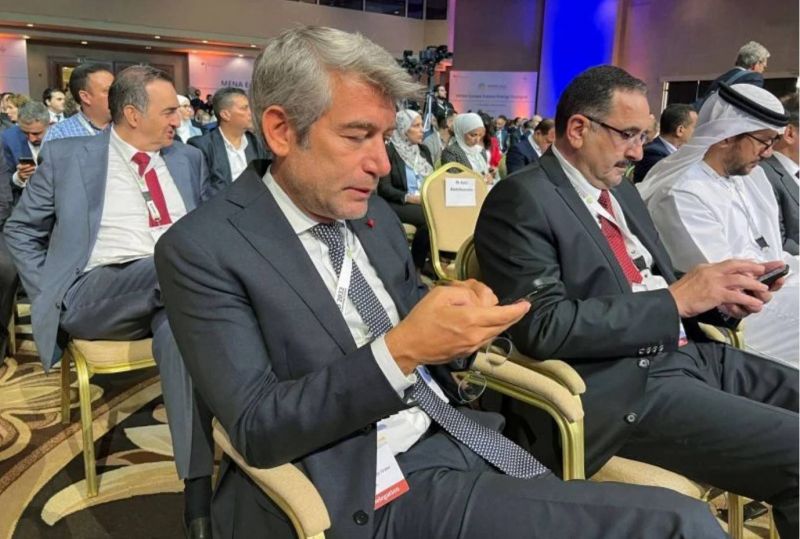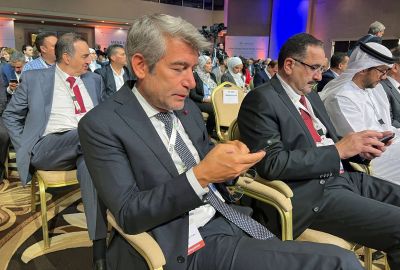
Outgoing Energy Minister Walid Fayad at a conference in Jordan, June 8, 2022. (Jehad Shelbak / Reuters)
It was a real declaration of war by Prime Minister-designate Najib Mikati against Gebran Bassil’s Free Patriotic Movement.
In his first proposed cabinet lineup submitted on Wednesday, the Tripolitan tycoon had replaced caretaker Energy Minister Walid Fayad (Greek-Orthodox), who is close to President Michel Aoun, the FPM’s founder, with Walid Sinno, a Sunni businessman. a move that would take the energy portfolio from the FPM.
It is a proposal that the FPM — which claims to be in favor of the rotation of ministries among political parties, but only if it involves all the ministries — seems to categorically reject for now, both at the political level — reform of the energy sector is the FPM’s hobby horse — and at the sectarian level — the allocation of this ministry to a Sunni and not a Christian has ruffled the Aounists’ feathers.
Selaata back to the forefront?
Why did Mikati, who is known for his conciliatory character and his ability to smooth the rough edges, choose to provoke the FPM like this?
“It was never the prime minister-designate’s intention to start an argument with anyone. However, he cannot continue to work with Walid Fayad, as the two are clearly at loggerheads,” said a former MP close to Mikati.
In May, a controversy broke out between the prime minister and his energy minister. During the last cabinet session, the latter had delayed the examination of the specifications for the construction of new power plants that Lebanon needs as part of the electricity plan.
The prime minister accused Fayad of being driven by a “political camp,” in reference to the FPM, and of obstructing offers made by Siemens and General Electric to build power generating facilities that would supply the country with 24 hours of electricity per day at lower cost.
According to the prime minister’s close circles, the FPM does not want to endorse a plan that does not include the construction of a third power plant — in addition to the one in Deir Ammar (north of Tripoli) and in Zahrani (south of Saida) — in the predominantly Christian town of Selaata (in the Batroun district).
Some observers have accused FPM leader Gebran Bassil of seeking to build this third plant in a predominantly Christian area, more specifically in his stronghold of Batroun, in order to be seen as the hero capable of securing his community’s rights.
Speaking to L’Orient-Le Jour, former Energy Minister and current MP Nada Boustany (FPM/Kesrouan) firmly denied these accusations. “The only thing that the FPM wants is the implementation of a scientific and efficient electricity plan,” she said.
She added that she does not care about the third plant’s location. “Our position is neither populist nor sectarian. The latest study by the [French power group] EDF clearly indicates that there is a need for a third plant — they can build it anywhere they want,” Boustani stated.
However, Marc Ayoub, an energy policy researcher at the American University of Beirut, has a more nuanced opinion. “In the medium run, Lebanon will be perfectly fine by building new power plants in Deir Ammar and Zahrani, and by integrating renewable energy into the energy mix. It is even necessary to dismantle thermal power plants, such as the one in Zouk. It is only in the long run that the issue of a third plant comes up,” he told L’Orient-Le Jour.
Fayad argued back then that the study of the specifications was delayed to allow a more thorough examination and launch a tender “in due form” in a transparent manner.
An opponent of the prime minister even insinuated that Mikati wanted the cabinet to award the contract to a company without a call for tenders, which is why he wants to appoint a minister close to him.
Mikati’s side denied all of these allegations.
“If Mikati chose Walid Sinno, it is neither for his sectarian affiliation nor for his political positions. He wanted someone he knows well and who has enough experience in this field,” said the former MP who is close to the prime minister. “Mikati wants to use all his political weight to reform the sector,” the source added.
The Fayad plan
This standoff comes at a time when the reform of the energy sector is at the heart of the international community’s demands. Several options are therefore on the table. The latest is the plan proposed by Fayad in February, In which the construction of a third power plant is relegated to the long term.
The plan initially calls for maximizing Lebanon’s current production capacity by importing hydrocarbons from Egypt and Iraq in the short term, which would allow the country to secure 10 hours of power supply per day.
This project is mainly contingent on the activation of two components of the US initiative unveiled in August, namely the projects to import electricity from Jordan and gas from Egypt via Syria.
In the medium run, Fayad’s plan proposes to build major facilities in Zahrani, including an 825-megawatt gas-fired plant. At Deir Ammar, the plan calls for adding a temporary gas turbine to boost the site’s production capacity.
Renewable energy is also part of the plan. The medium-term phase includes the construction of 12 solar farms and three wind farms. In all, this would provide up to 18 hours of electricity per day.
Finally, the Selaata issue is only part of the long term phase, as the plan foresees the construction of two additional gas-fired power plants in Selaata and in Deir Ammar, which would allow Lebanon to reach the holy grail of 24 hours of power supply per day.
This article was originally published in French in L'Orient-Le Jour. Translation by Joelle El Khoury.
